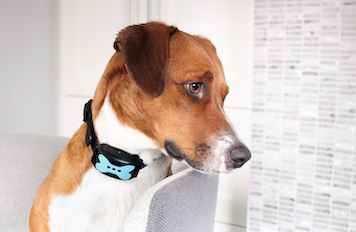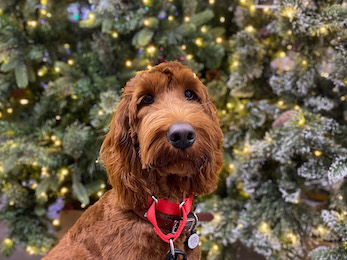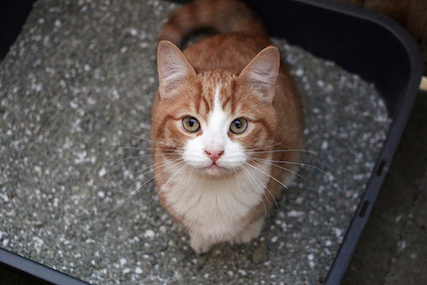A new puppy can bring so much joy and so much chaos to your home! Training is the first step to reducing that chaos but knowing when to start, who to hire, and what type of program can be an overwhelming decision on its own. There are numerous things to consider with a seemingly endless list of options. Furthermore, you may get solicited and unsolicited advice from friends and family. After nearly two decades of helping thousands of owners train their puppies, I rely on both science and real-world experience to guide my suggestions.
When to Start Training Your Puppy
One of the most common questions I receive is, “When should I start training my puppy?”. My answer is always, before you get your puppy! In fact, many breeders or foster families begin potty training, socialization, and crate training well before 8 weeks of age. Further, enrolling in private training prior to bringing your puppy home —one that is based in positive reinforcement—can get you started on the correct path and avoid big headaches later. I recommend having a training plan in place to cover typical puppy manners including potty training, socialization, crate training, puppy biting, chewing, and jumping. Potty training, socialization, and crate training should begin at 8 weeks (if not sooner) and as soon as your puppy comes home. Puppy biting, chewing, and jumping can also be started at 8-9 weeks of age, but my clients don’t usually report it problematic until around 10-14 weeks of age.
Obedience behaviors like sit, down, stay, and leash walking can be started as early as 8-9 weeks if you find yourself with plenty of time and want to get a jumpstart on early obedience training! Most of my clients wait until 12-14 weeks to begin more advanced obedience behaviors (i.e., commands other than sit or leash walking).12-14 weeks is an ideal age not because young puppies (i.e., 8-9 week-old-puppies) don’t have the capacity to learn high level obedience behaviors, but it can be difficult to keep their attention for the (typical) 1-hour session. Training can be hard work and puppies are often exhausted after 30 minutes! Delaying until your puppy is 3 months old allows them to gain a bit more training stamina and is especially important if you’re confined to 1-hour training sessions with a professional.
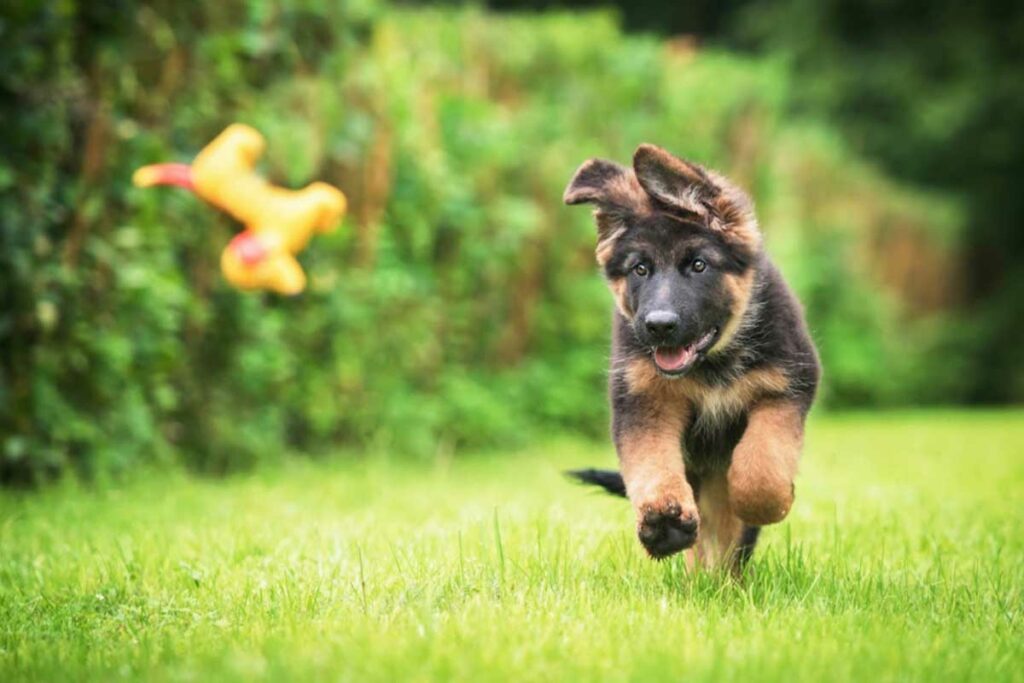
Who to Hire to Train Your Puppy
It’s important to find a trainer that can teach your puppy using primarily positive reinforcement such that your puppy develops a love of training. I strongly advise against hiring a trainer that uses shock, vibration, prong, or choke collars in a young puppy. Instead, find a reputable company that is led by a Certified Applied Animal Behaviorist (CAAB) or Certified Dog Behavior Consultant (CDBC). If there aren’t any CAABs or CDBC’s in your area, I recommend finding a Certified Pet Dog Trainer (CPDT-KA) or a Certified Behavior Consultant Canine (CBCC-KA). If you hire a trainer with a good understanding of how positive reinforcement can shape behavior and how to apply it to puppy behavior, you’ll be well on your way to having a well-mannered, happy puppy that you get to enjoy for years to come.
What Type of Puppy Training Program
Aside from focusing on positive reinforcement, I recommend considering the structure of a training program and your overall goals. Individualized, private training can be a great investment in your puppy’s future. I prefer in-home private training over group classes. Although group classes are affordable and can be a lot of fun, individualized one-on-one instruction can’t be beat if you’re interested in establishing good behavior or modifying problem behavior. Group classes also offer socialization with other puppies if off-leash playtime is available, however, I do find that all puppies need more socialization than a weekly puppy class can offer. When enrolling in private training, a little can go a long way when it comes to establishing appropriate manners in a young puppy. Generally, 1-3 hours of private, one-on-one training will get you started on typical puppy behaviors. For advanced obedience training, I recommend a more intense in-home program once your puppy is 12-14 weeks. Such programs often involve multiple days per week of training for several weeks in a row.
If you’re feeling overwhelmed by your new 4-legged family member or plan to travel, you might consider sending your puppy away to be trained in a board and train program. Board and train programs can be great if properly designed. In a board and train program, a trainer is not confined to the time limit of a training session so manners and obedience behaviors can be established concurrently as early as 8-9 weeks. In fact, many of my clients send their puppies to me straight from the breeder or rescue agency! An adequate board and train program involves your puppy living in the home of a trainer. I do not recommend sending your young puppy away to an overnight kennel or boarding facility for intense training. Puppies need to acclimate to a typical home with normal sights and sounds as well as have a trainer who can provide adequate amounts of one-on-one attention and play. The board and train program should include in-home instruction and training for you upon completion of the program. These lessons are critical in the success of the training program because your puppy’s behavior won’t automatically generalize to you and your home.
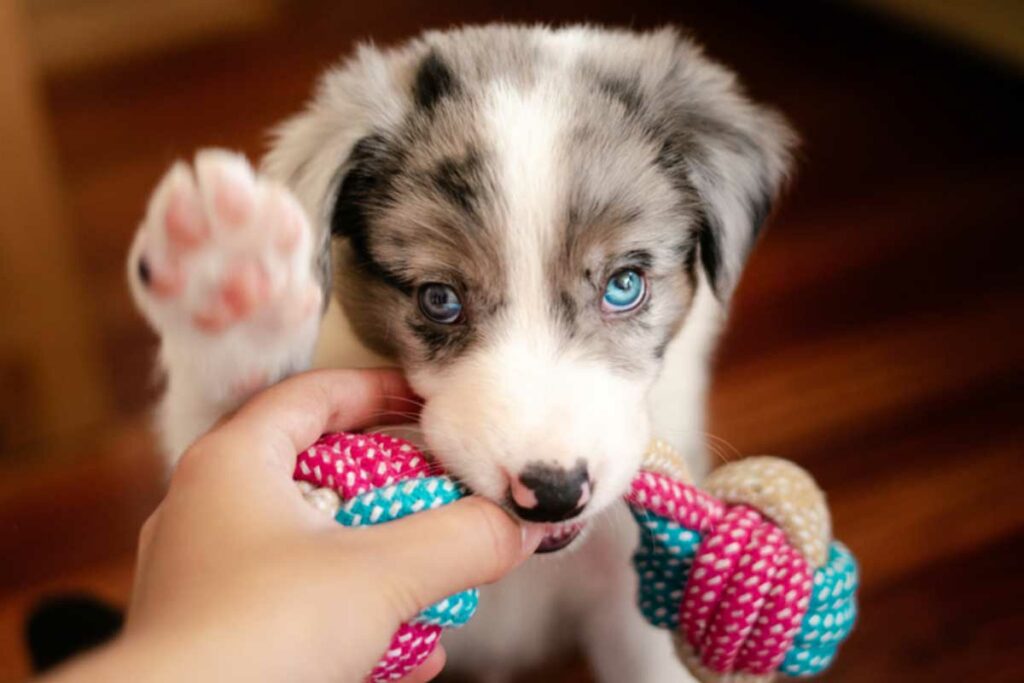
Of course, you don’t have to hire a professional or enroll in private training to help train your puppy. You can find great puppy training resources online! Feel free to check out our training videos here. If you decide to hire a professional to help train your puppy, I hope this blog helps guide you in selecting the right trainer for you and your family. Although an initial investment, it’s my hope that training can help you enjoy your puppy into adulthood and for 10-15 years or more!

